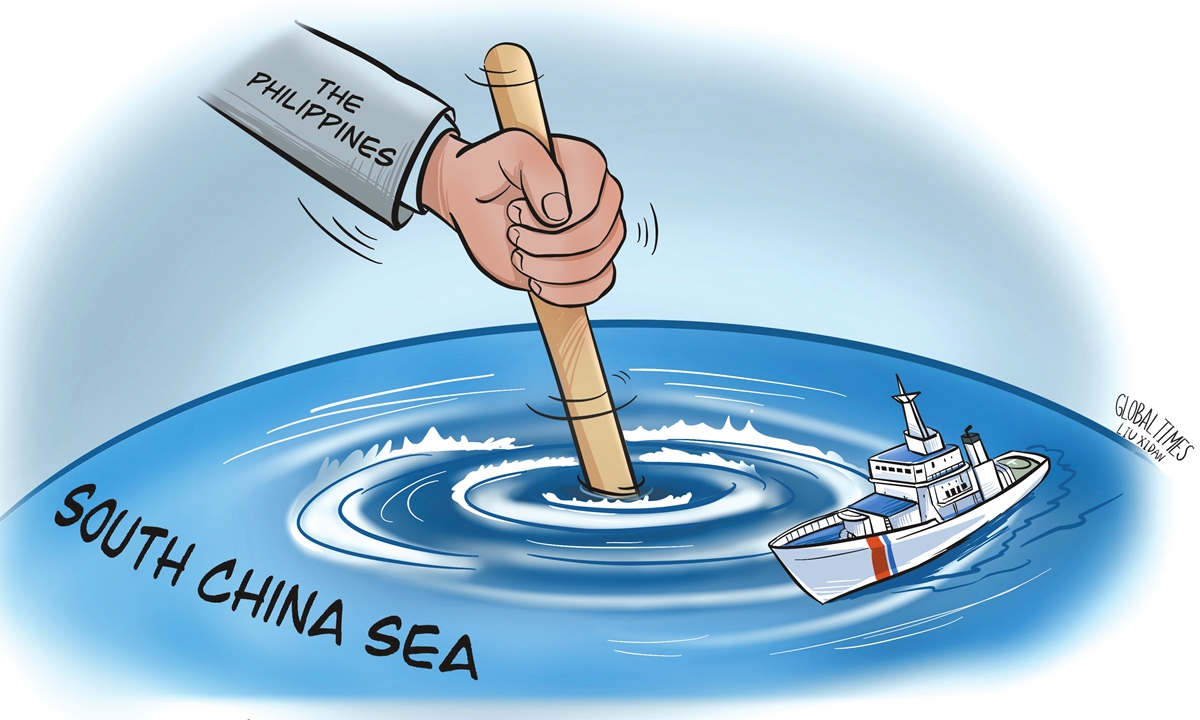
Illustration: Liu Xidan/GT
Continuous provocations in the South China Sea seem to have become an addictive game for the Philippines, but failure has also become a fate that it cannot escape.
According to China Coast Guard (CCG), two Philippine Coast Guard vessels 4409 and 4411 on Monday intruded into the adjacent waters of China's Xianbin Jiao without the permission of the Chinese government, approaching dangerously a CCG ship that was in normal navigation. The CCG has taken lawful control measures against them.
One day earlier, Philippine Ship 3002 illegally intruded into waters near Xianbin Jiao. It ignored repeated warnings from the Chinese side and deliberately sailed toward a Chinese ship in an unprofessional and dangerous manner, causing a collision.
The Philippines really needs to carefully consider whether it should continue these provocations or change its course and engage in serious negotiations with China on how to manage and resolve the dispute, particularly the issue of the Philippine Coast Guard ship MRRV-9701 having illegally stayed in the waters of Xianbin Jiao for around four months. Its presence has become a major point of contention between China and the Philippines.
The Philippines should not assume that the ship can remain indefinitely. There is no chance that China will be deceived by the Philippines again, especially after the Philippine warship BRP Sierra Madre illegally grounded at Ren'ai Jiao and repeatedly failed to fulfill its promises to tow it away.
The best option for the Philippines is to leave. In the complex and sensitive geopolitical game, engaging in a cognitive war cannot bring any substantial benefits to the Philippines, aside from creating some noise in diplomacy and public opinion. It is more beneficial for the Philippines to assess the situation rationally and take practical measures.
The first priority is to prevent a humanitarian crisis caused by the lack of supplies for the Philippine Coast Guard ship MRRV-9701. The illegal stationing of the Philippine vessel itself is a provocation to China's sovereignty, and China's corresponding countermeasures are not only necessary but also completely justified. The Philippine government has put the Philippine Coast Guard personnel in danger, proving that they do not care about the safety of their own personnel. To prevent a humanitarian crisis, the best course of action for the Philippines is to immediately withdraw the Philippine vessel.
The second point is to avoid escalating conflicts. Facing a China whose maritime and military strength far exceeds its own, playing the "South China Sea card" is extremely dangerous for the Philippines. With the US having proven that it only engages in empty talk, if China launches a full-scale counterattack, the Marcos administration will face a situation where it loses on all fronts in the South China Sea issue, leading to questions about its ability to govern.
The third point is to avoid a complete breakdown in China-Philippine relations. So far, the disputes between China and the Philippines have been limited to the South China Sea and have not significantly affected other areas of bilateral relations. This is fortunate for the two countries, but it is also clearly the result of China showing restraint.
The experience of others is a valuable reference. The Philippines can look at how Vietnam, another South China Sea claimant, has handled the situation. The General Secretary of the Communist Party of Vietnam Central Committee, To Lam, recently visited China, and both sides agreed to properly manage maritime differences and jointly safeguard regional peace and stability.
The Philippines should seriously consider its next move.
The author is vice president of Shanghai Institutes for International Studies. opinion@globaltimes.com.cn




